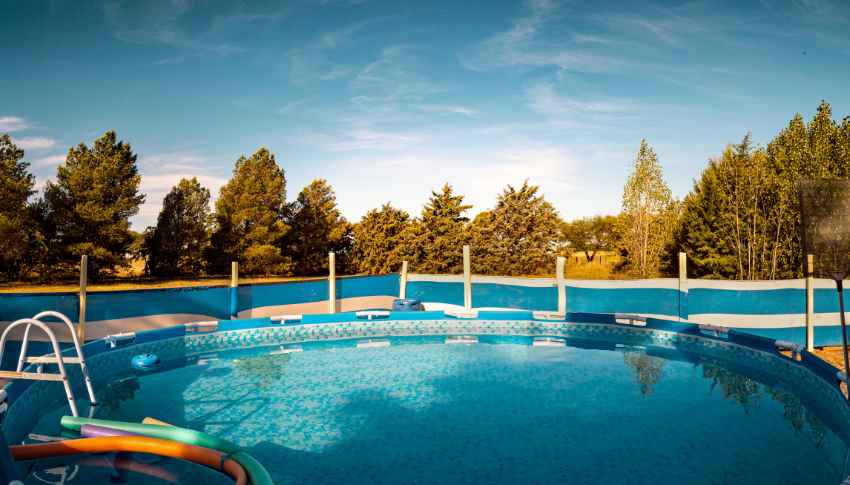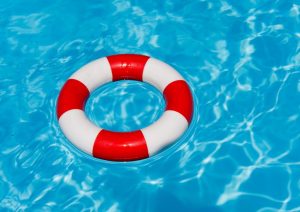
7 Best Swim Snorkels for Better Technique and Faster Swimming
Ready to throw down on a new swimmer’s snorkel? Here are reviews of the best swim snorkels for lap swimming.

Cloudy pool water can be a real buzz-kill when you want to cool off and have a swim. Here’s what you need to know about swimming in cloudy pool water.
The sun’s out, the pool’s calling your name, and you are ready to cool off in the waters of your backyard pool.
You peel the solar pool cover off and stop in your tracks…
The pool has clouded over.
Decision time: Do you risk it and hop in anyway?
Answer: Probably not.
In this article, we will look at some of the common scenarios why the pool is cloudy to begin with (so you can deal with it quickly and jump in worry-free) and also detail some situations where it might be okay to swim in cloudy pool water.
Let’s jump right in.
Okay, beyond the initial “that kind of looks yucky” aspect to not swimming in cloudy pool water, there are some more serious reasons to hit pause on that magnificent cannonball.
They include:
Safety first and all that, right?
Cloudy pool water simply makes it harder to see things in the water, including other humans.
Pool equipment like pool ladders, steps, and even grades of the pool bottom can be obscured by cloudy pool water, making jumping in, diving, and swimming more dangerous.
Additionally, should the unthinkable happen (and the unthinkable happens a lot—nearly 4,000 kids drown each year in the United States1), cloudy pool water makes it more difficult to assess if a swimmer is in duress or worse.
No one likes getting sick, especially when it’s enjoying the fun and sun of a backyard pool. But cloudy swim pools are a breeding ground for bacteria.
We all know the importance of drinking treated water to avoid water-borne bacteria. It’s no different when exposing ourselves to the water in our swimming pool. The water should be treated and sanitized.
Even though you aren’t drinking it, water will get in your mouth, ears, eyes, and nose when splashing around.
The resulting illnesses are not fun at all2:
Generally speaking, a little bit of cloudy water isn’t the end of the world, and remedying (balancing the water) is straightforward and can usually be done overnight, when it’s best to shock the water.
Pool water, as its left untreated (or not the pool equipment like the filter and pump fail or slow), goes through a few stages, from sparkling and clear, to when it’s still clear but not sparkling stage, to a light haze, to cloudy, to milky and can’t-see-the-bottom phase.
Exercise caution from the cloudy phase and up.
If you cannot see the bottom of the pool in the shallow end, that is an easy “DO NOT SWIM” sign.
Pool ownership can feel frustrating at times, trying to navigate the tight balance of proper pool chemistry along with the regular cleaning and maintenance of the pool and pool equipment.
But when it comes to cloudy pool water, there are generally just two culprits:
Clean pool water depends on proper pool chemistry. It can be imbalanced in a variety of ways, though it typically happens because the pH is off, along with chlorine levels.
When your pool doesn’t have the right amount of chlorine, it may not be sanitizing as it should.
If pH levels aren’t balanced correctly, it renders free chlorine ineffective and algae and bacteria can grow, which isn’t good either.
This is another extremely common cause of a cloudy pool and one that will require some old fashioned elbow grease and troubleshooting than cleaning out leaves or adding a little chlorine to the water.
Poor filtration makes not only for unsightly pool water, but makes it dirty, as well.
Around 90% of pool cloudiness is actually caused or connected to inadequate filtration.
This is most often caused by a clog in the filter, the filter needing to be changed, a dying pump, or just not running the filter long enough.
If the pool water is cloudy and it has a very strong chlorine smell, this is a sign that the pool is not even close to being properly balanced or sanitized.
The “smell of chlorine” is actually chloramines, the byproduct of free chlorine (that sanitizes) and organic matter in the pool.
The smell is an indication that there is more combined chlorine in the water than free chlorine, which means your pool is not being properly sanitized and will only get worse until you balance the pool chemistry.
Alleviating this issue this starts with using a pool test strip to gauge chemical levels and applying pool shock as necessary).
See also: How Often Should You Shock Your Pool? (And How to Do It Like a Pro)
Nothing quite beats jumping into a cool, clean, and sparkling backyard pool during the blistering days of summer.
Although a little haze in the water isn’t a reason to close the pool (someone may have just plastered on too much sunscreen before jumping in the pool, after all), it is something to keep an eye on.
Remember to always keep your pool clean as possible, stay on top of balancing pool chemicals, and periodically check on your filter and pump, and you will avoid pesky pool closures due to unswimmable water.
How to Open an Above-Ground Swim Pool Like a Boss. Looking to open your above-ground pool for a season of sun and fun? Here is a simple 9-step process for opening your pool like a champ.
How to Drain an Above Ground Pool. Looking for information on how to drain an above ground pool? Follow the simple steps in this guide and do it right the first time.
Subscribe to the YourSwimLog.com newsletter and get tips and advice on how to swim faster every weekday morning, straight to your inbox.
Join 33,000+ swimmers, coaches, and swim parents learning what it takes to swim like a boss.
Unsubscribe anytime. Email will never be shared or sold.

Olivier Poirier-Leroy Olivier Poirier-Leroy is the founder of YourSwimLog.com. He is an author, former national level swimmer, two-time Olympic Trials qualifier, and swim coach.

Ready to throw down on a new swimmer’s snorkel? Here are reviews of the best swim snorkels for lap swimming.

Looking to get some new swim gear on a budget? Shop the best Black Friday deals for swimmers in this exclusive guide.

Looking for the best swimming app to maximize your time and effort in the water? Here’s a look at the top swim apps for conquering your swim workouts.

Wondering how often you should be testing the water in your pool or spa? Here’s a detailed look at how frequently you should test your pool. Your swimming pool and spa relies on being properly balanced to keep the water clean and safe for swimming. As a pool owner, you

Fed up with the effects and smell of chlorine in your hair after swimming? Here is how to remove chlorine from your hair once and for all.

The DMC Elite fins are high-performance training fins for competitive swimmers. Here’s a review of why these fins are flat-out awesome.

LANE 6 PUBLISHING © 2012-2024 · PRIVACY POLICY · RETURN POLICY · TERMS OF SERVICE · AFFILIATE DISCLOSURE